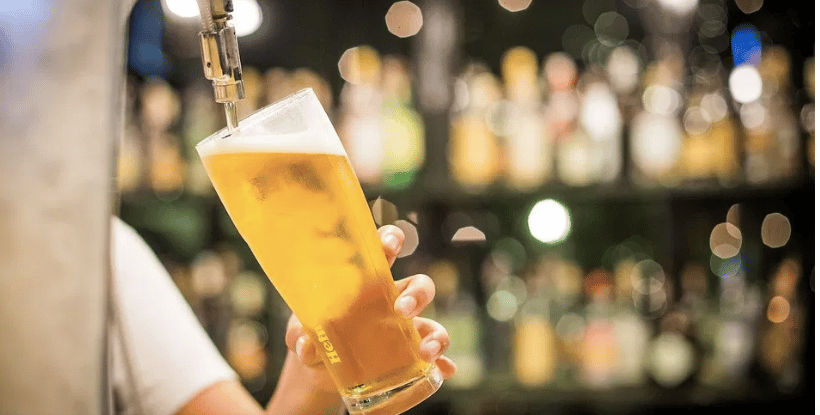On a recent outing to Odell Brewing’s new brewhouse and taproom in Denver’s RiNo neighborhood, a burgeoning part of town filled with breweries, coffee shops and twenty-somethings, I’m reminded of just how pervasive government is when it comes to influencing what can be built and where. This place seemingly has it all: plenty of seating and bars on two levels, a rooftop patio and a grade level patio. It’s kid friendly, dog friendly and there are plenty of unique beers only available at this particular location. One beer of note is The Real Dill Pils, a surprisingly delicious and refreshing beer on a hot summer day and a fantastic find on a Sunday afternoon of brewery hopping. There is a restaurant right next door and a food truck could pull up at any moment, so what’s not to like?
In Colorado, if you are trying to sell your own beer, you are required to brew in the same place that you sell. There are other compulsory distribution options, but if you want to establish a tasting room where you can sell your own branded beer, then the only option is to brew in the same place that you are selling. Even well established breweries cannot simply brew beer at an offsite and more cost effective location and then sell it at a remote, free standing tasting room. This severely hampers small business development in the beer industry. One of the great things about the Odell Brewhouse in RiNo is that they are producing unique, collaborative and creative beers at this location – which is great for beer lovers. But, this business decision has clearly been influenced by government regulations. Within the context of what they were “allowed” to build and operate at this location, the decision might make sense, but it’s hard to tell, perhaps a true stand alone tasting room would have been a better economic decision, but the regulatory state has already decided for the businessman; that’s not even an option.
The development possibilities for small businesses are endless in the realm of small batch and homebrewing industries. For instance, there could be consortiums of small, independent brewers (brewing off-site) who band together to have their beers featured in a neighborhood tap room. It’s very possible this business model makes no sense, but that’s not for government to decide. In a beer mecca city like Denver, there should be vast amounts of creativity when it comes to beer production, delivery and sale, but within the realm of government coercion, creativity and innovation are stifled. True brewing freedom cannot exist without economic freedom.
But, what about safety? Can you hear the objections from the masses? We can’t just have brewers willy-nilly brewing beer off-site in unsanitary conditions and selling to the unknowing public! Many are quick to lean on the crutch of government regulation forgetting that homebrewers, small brewers and businesses in general realize that consumer confidence is key. Independent third party testing agencies would spring into action to provide a safe-to-drink certification service, encouraged by the brewers and consumers themselves, all outside the realm of government coercion. Even if a brewer decided to forego third party certification, that’s an economic decision for them to make. Would you drink a beer from a homebrewer that your were not personally familiar with? Every person will answer that question differently. Let us not forget that one of the most egregious cases of tainted alcohol came via the hand of government, who during Prohibition purposely poisoned re-distilled industrial grade alcohol (used in paint and cleaning products) in a process referred to as denaturing which killed up to ten thousand people when enterprising bootleggers reprocessed the products back into something vaguely drinkable, who then sold it to an unknowing public, poison and all. But, I digress.
Within the small physical space of the brewhouse and taproom, there is a massive amount of government economic intrusion. Think of the restaurant right next door that should be able to open up directly to the patio of the brewery and sell food, but can’t. Think of the restaurant right next door that should be able to offer micro brew beer to their patrons but can’t (not without a distributor or obtaining a license themselves, that is). Or, not without Odell wanting to be their own distributor at this location. Which they could be, but why? Who benefits? Why all this extraneous government intrusion into what should be a simple economic calculation? Would beer sell at this restaurant? Maybe not, but that’s not for government to decide.
Think of all the government bureaucracy associated with building permits and regulatory compliance with setting up a brewhouse and taproom compared to a stand alone tasting room. It all adds up and the consumer pays for it. Think of all the standard government talking points about “helping the little guy,” yet the reality is that the little guy is constantly regulated out of the beer industry.
In the 1900’s, prior to Prohibition, there were over 4,000 breweries operating in the U.S. with the number effectively falling to zero during Prohibition. After Prohibition was repealed, the number of breweries rose to around 30. Small breweries were absolutely decimated and in the ensuing decades, a handful of larger breweries were able to command and control an unprecedented amount of the beer market. This sordid story is improving for smaller breweries as their numbers are continually on the rise, finally surpassing Pre-Prohibition numbers about ten years ago. Alas, overbearing government regulations are doing nothing but extinguishing the flames of creativity and stifling an industry based on individuality and entrepreneurship. But, rest assured, government is here to help.
Republished from The Denver Libertarian.
































